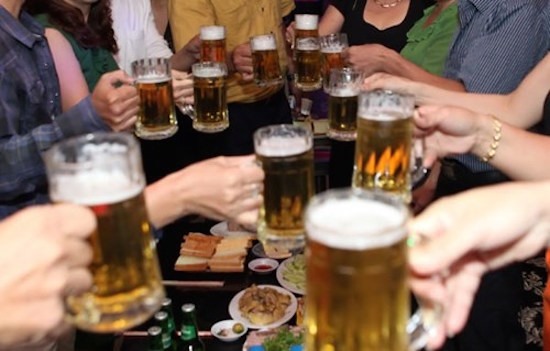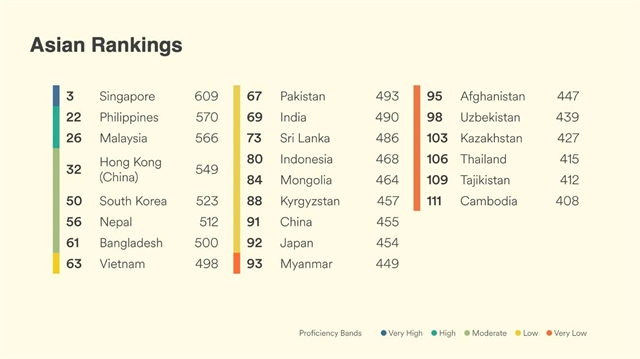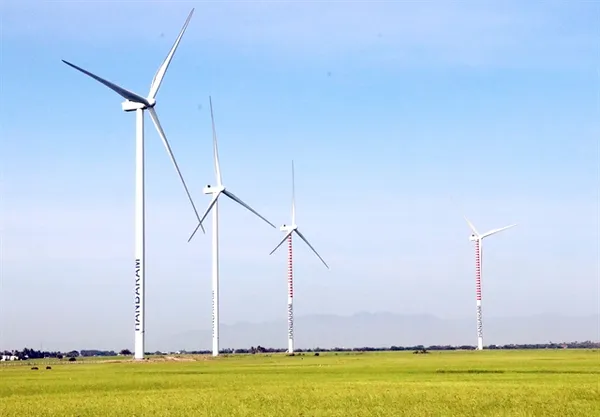 Society
Society

Representatives of beverage producers and traders said at a workshop in Hà Nội on Wednesday the draft law to limit the harmful effects of wine and beer was not feasible.
 |
| Adult men consume 27.4 litres of alcohol per year. — Photo laodong.vn |
HÀ NỘI — Representatives of beverage producers and traders said at a workshop in Hà Nội on Wednesday the draft law to limit the harmful effects of wine and beer was not feasible.
The draft law on alcohol harm prevention was recently proposed by the Ministry of Health.
The ministry is finalising the draft and plans to submit it to the National Assembly for consideration in October. The first draft law had banned the sale of alcohol after 10pm, but the provision was not feasible for implementation.
Participants at the workshop opined that the draft law should not limit the sale of beer, wine and alcoholic products.
“It is difficult to supervise the sale of alcohol and beer. In addition to this, limiting the time for selling alcohol and beer may affect tourism. International experience shows that such a law may backfire and consumers may be irresponsible with alcohol consumption,”said Nguyễn Văn Việt, chairman of the Vietnam Beer-Alcohol-Beverage Association.
“Moreover, lessons learnt from the operation of the tobacco use control and prevention fund over the last few years show that this model is unsuccessful and not the most effective way to reduce alcohol abuse,” Việt said.
According to Nguyễn Tiến Vỵ, vice chairman of the Vietnam Beer-Alcohol-Beverage Association, the draft law’s proposal to limit the time of sale of alcohol and beer would only make people buy more illegal goods.
He said Việt Nam was unable to control the production of illegal and home-made wine, which reaches 200 million litres annually.
“Twenty-eight per cent of beer and wine production in the market is illegal,” he said, adding that the total value of the market for illicit beer and wine was worth up to US$910 million, causing a loss of $441 million to the State budget.
Echoing Vỵ, Matt Wilson, director of Corporate Affairs of Heineken Vietnam, said in today’s world (where alcohol consumption is rampant), people will break the law banning the sale of alcohol.
“The ban on selling alcohol and beer within the regulated time frame will make people drink more. For example, if the ban is effective after 10pm, people will try to drink as much as possible before that and then find other illegal wines,” Wilson said.
He added that the law should focus on stopping the manufacture of illicit alcohol as it was unsafe and did not contribute to the country’s economy in the form of taxes.
Advertising and tax policy needs to take into account the large, illicit market to ensure that policy measures do not drive more consumers away from safe and legitimate products to unsafe and illegal alternatives, Wilson said.
Participants at the workshop did not support the proposal to establish a public health fund combining the tobacco use control and prevention fund and the fund for prevention of harm from alcoholic beverages.
Nguyễn Đức Kiên, vice chairman of the National Assembly’s Economic Committee, said the merger of the two funds would lead to the use of funds contributed by the liquor industry to support other issues not related to the industry.
Many consider the tobacco use control and prevention fund ineffective and have called for its abolition.
Some participants suggested conducting more researches on the establishment of a fund for preventing alcohol abuse, given the small scale of the country’s economy and modest financial sources.
The health ministry had previously said the consumption of alcohol in Việt Nam was alarming. Adult men consume 27.4 litres of alcohol per year. In 2015, 80.3 per cent of adult men said they had consumed alcohol for 30 days straight.
The health ministry hopes the draft law on the prevention of alcohol abuse would control the demand and supply of alcohol to improve public health. — VNS









